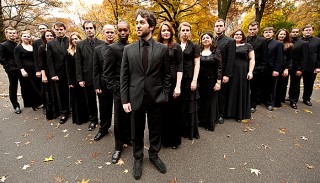Title

The Clarion Music Society Choir (pictured) joins Juilliard415 for Bach’s Magnificat and other works on March 23.
(Photo by Kim Fox)This month, two of New York’s finest period ensembles will collaborate for the first time: Historical Performance’s Juilliard415 and the Clarion Music Society Choir. Clarion’s artistic director, Steven Fox, will conduct the March 23 performance, which features music of the German and Italian Baroque.
Body
For period specialist Fox, the urge to conduct goes back to his high school music teacher, Johannes Somary. “If it weren’t for him,” Fox told The Journal in a recent interview, “I’m not sure I would have gone into conducting.” In addition to being the longtime chairman of the arts and music department of New York City’s Horace Mann School, where Fox attended high school, Somary was also the founder and music director of Amor Artis, an organization dedicated to neglected choral masterpieces of the Baroque and Classical periods.
One day during Fox’s junior year, Somary told him he possessed “the personality and skills to be a conductor,” Fox recalled. From then on, he studied privately with Somary, resulting in him conducting a performance of Vivaldi’s Magnificat. It was at that moment, Fox said, he “was bitten by the bug.”
Since then, Fox has come to specialize in period performance, ultimately “won over by the sound world” and “transparency” created by historical instruments. After obtaining a degree at Dartmouth, he founded Musica Antiqua St. Petersburg in Russia, the country’s first period-instrument ensemble. He returned to New York in 2006 to restart the Clarion Music Society, which had been founded in 1957 but had disbanded in 1996. Now Clarion is once again a respected and celebrated early-music organization.
Clarion joins Juilliard415 to perform J. S. Bach’s Magnificat in D Major, BWV 243, which Fox calls a “festive, majestic, and grand piece” that’s particularly well suited for Alice Tully Hall, where the concert will be held. Fox is drawn to the five-part choral texture of the work, which is “very rich and very florid,” reminiscent of the “great polyphonic, High Renaissance works that Bach would have known so well.” Calling it a great cantata-style piece, Fox praised the Magnificat’s “tremendous variety, tremendous virtuosity, and great flair.” The performance will feature vocal soloists from Juilliard’s Marcus Institute for Vocal Arts: sopranos Julia Bullock and Heather Engebretson, mezzo-soprano Rachael Wilson, tenor Spencer Lang, and bass-baritone Davone Tines.
Preceding the Magnificat is Corelli’s Concerto Grosso in D Major, Op. 60, No. 4. According to Fox, there’s a very direct relationship between Bach’s work and Italian concertos in that Corelli influenced Vivaldi who in turn influenced Bach. To him, Corelli’s work is “absolutely brilliant;” it also provides an opportunity to show off three soloists from the orchestra (two violins and a cello) that create the concertino.
On the first half of the concert is Handel’s solo cantata Silete Venti, to be sung by Juilliard soprano Ying Fang, and Bach’s Concerto in A Minor for Violin, BWV 1041, featuring Nanae Iwata as soloist. According to Fox, the pieces work in tandem because of the “vocal” nature of Bach’s violin writing. He also describes Handel’s work as “wonderfully dramatic” and as having “great energy and verve.” As one of Handel’s greatest sacred Latin pieces, it is a “real showcase” for the soprano soloist and the orchestra, Fox said.
Iwata (B.M. ’06, M.M. ’08, violin) is currently working toward her second master’s degree, this one in Historical Performance under the tutelage of Monica Huggett and Cynthia Roberts. In an e-mail, she told The Journal that what she finds most compelling about this concerto is “not necessarily about the piece itself, but about its place in the violin pedagogy. It is one of those pieces that practically every violinist has played before the age of 10 and is generally regarded as a ‘student’ piece. As I practice it now, I’m constantly drawn to the beauty of Bach’s contrapuntal writing in a way that I never imagined as a child. And his use of form is incredibly nuanced. I’m so happy that I’m able to revisit a masterpiece that has long since been misunderstood.”
Iwata describes herself as “very much a modern player,” but she has enjoyed her time in the Historical Performance program. “The two styles are obviously very different, and one is not better than the other, but I do tend to find that playing in the Baroque style on period instruments allows you more freedom and a great deal of inspiration,” she said. “I feel very fortunate to have the opportunity to approach things from a very different perspective.”




